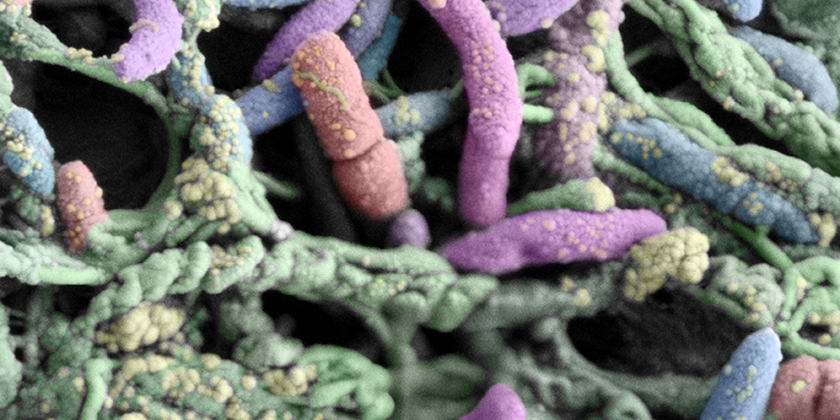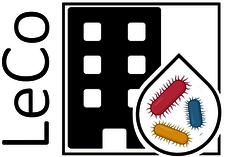Department Environmental Microbiology
LeCo project – Legionella control in buildings

Legionella is a gram-negative opportunistic pathogen that naturally inhabits building plumbing systems and can cause pneumonia called Legionnaires disease and a milder, flu-like illness called Pontiac fever when bacteria-containing aerosols are inhaled. In response to the growing number of cases of Legionnaires’ disease in Switzerland, the Federal Food Safety and Veterinary Office (FSVO), in partnership with the Federal Offices of Public Health (FOPH) and Energy (SFOE), initiated the LeCo (Legionella control in buildings) project.
Five Swiss research groups have joined forces to tackle the Legionella issue in this wide-ranging, multi-disciplinary research project. The LeCo project was launched at the beginning of 2020 and will run for four years. The groups are:
Frederik Hammes, Drinking Water Microbiology, Eawag
Tim Julian, Pathogens & Human Health, Eawag
Antonia Eichelberg, Trinkwassermikrobiologie, Eawag
Daniel Mäusezahl, Dept. of Epidemiology & Public Health, Swiss Tropical and Public Health Institute
Hans Peter Füchslin, Legionella Unit, Zurich Cantonal Laboratory
Franziska Rölli, Institute of Building Technology and Energy, HSLU
Reto von Euw, Institute of Building Technology and Energy, HSLU
Over the next four years, the team will focus on a range of topics including risk assessment, improved sampling strategies, standardized rapid detection methods, the relationship between environmental sources and incidence of disease, and explore new insights into the environmental response and ecology of Legionella in drinking water systems. Ultimately, management strategies will be developed to reduce the risk of Legionella contamination in buildings. The project will also be focusing on raising awareness and increasing communication among the various national and international stakeholders.
Click here for more information and news updates (Project-Blog)

Prof. Dr. Daniel Mäusezahl
Swiss-TPH
Tel. +41 61 284 8178
Send Mail

Dr. Hans Peter Füchslin KLZH
Tel. +41 43 244 7160
Send Mail

Franziska Rölli
HSLU
Tel. +41 41 349 3844
Send Mail

Prof. Reto von Euw
HSLU
Tel. +41 41 349 3423
Send Mail

Federal Office of Public Health: Further information on legionnaires’ disease (in French/German/Italian)
Interview with Frederik Hammes
Why is Eawag addressing the topic of legionella?
Firstly, the FOPH data clearly shows that legionella is a growing problem throughout Switzerland. As the federal institute responsible for aquatic research, investigating this issue is not only part of Eawag’s mission, but we also have the necessary expertise on the microbial ecology of drinking water systems in buildings.
Secondly, a few years ago, we discovered high legionella concentrations in the plumbing system of our own building. So we were able to study this problem – which affects many buildings in Switzerland – on our doorstep and resolve it on-site.
How do you explain the sharp rise in cases of legionnaires’ disease over the last few years?
It’s important to mention that the same trend can be observed in many European countries and also in the US. The increase in the number of cases is certainly attributable to closer monitoring and a growing awareness of the problem. However, there are various other contributory factors. It’s suspected that, for example, changes in the installation and operating conditions of water systems, as well as climate- and weather-related factors, are also contributing to the increase.
The “hygiene versus energy saving” dilemma will presumably persist, or is a solution in sight?
It’s a question of finding solutions that allow both aspects to be considered. There are definitely scientific/technical solutions for this dilemma. But there’s a need for active and constructive dialogue between the various stakeholders and a clear commitment to tackle the problem.
Only public baths, schools or old people’s homes are inspected. Should I also have my own shower inspected?
The inspection of public water systems is a major first step, but the same awareness is also needed in private households. However, legionella problems are not prevented by monitoring alone. In other words, detecting the bacteria doesn’t solve or simply control the problem. To minimise the spread of legionella in plumbing systems – especially in buildings where vulnerable people live – solutions need to be based on engineering and operational approaches. These technical measures should prevent the proliferation of legionella, but at the same time elevated legionella concentrations need to be consistently and permanently eliminated, and the success of remedial measures must be subsequently checked.
You’re now leading a four-year research programme on legionella in buildings – what’s the most important question that is to be answered in this programme?
The further development, optimisation and standardisation of sampling and subsequent analysis represents, as it were, the foundation for effectively addressing other questions. But the legionella issue, in particular, requires different “strands” to be brought together if progress is to be made. That’s precisely what this project will enable us to do: we’ll be investigating the topic from a microbiological, medical and technical perspective. We also believe it’s important to promote awareness-raising and knowledge transfer between a wide variety of actors – from the scientist to the plumbing system planner, GP and property manager.
You intend to study how the occurrence of legionella is related to the frequency of infection – is Eawag venturing into the field of epidemiology?
No, not directly. The legionella problem is multidimensional, which is why our new project is multidisciplinary. We’ve deliberately involved groups with various types of expertise. These include Daniel Mäusezahl’s group (Swiss TPH), which deals with epidemiology and Human health; Franziska Rölli’s group (HSLU), which focuses on building technology; Tim Julian’s group (Eawag), which is concerned with microbial risk assessment; and Hans Peter Füchslin’s group (Zurich Cantonal Laboratory), which is responsible for routine monitoring and questions of legislation.



